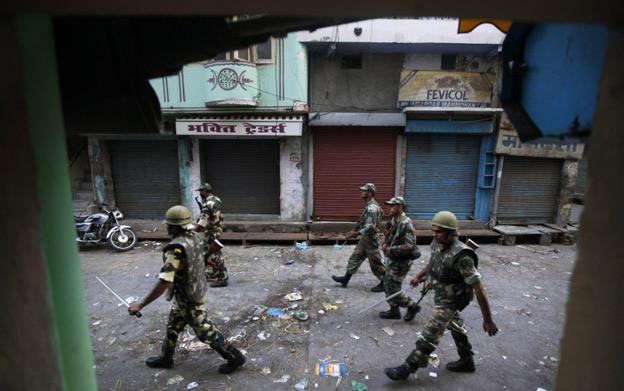A strong woman in Muzaffarnagar
- Published

On a visit to the Indian town of Muzaffarnagar, where fighting between Hindus and Muslims last month left dozens dead, the ДѓЯѓДЋУН's Joanna Jolly met a woman caring for a tiny orphaned baby and found herself wavering over the journalistic rule that interviewees should not get paid.
My local colleague, Joydeep, told me that amid the violence, there was a story of hope here.
We had found anger on both sides of the divide in the town of Muzaffarnagar - neighbour pitted against neighbour, rioters on the streets.
A community leader told us that for decades, Muslims and Hindus had lived together peacefully. But now, he said, they feared for their lives.
As he spoke, a crowd of maybe 100 men formed around us. They pressed in closely. Joydeep whispered that he was worried - it was time we left. But first, we wanted to investigate that story of hope.
We followed some of the men over streams of filthy water into a group of small brick houses, through an iron gate and into a courtyard.
There, in the arms of a seven-year boy, was a tiny baby. The men said the girl had been found 10 days ago, in a ditch. Her umbilical cord was still attached and she was being mauled by dogs.
They were convinced she was a Hindu child but said it was only the generosity of a good Muslim woman that had kept her alive.
The woman had taken her in, even though she had eight children of her own.
I wanted to meet this woman, so the men pushed her forward. She was small, but well-built.
Joydeep, who was translating, said she was 36, but she seemed decades older.
We asked the men to leave so we could talk to her. They stood back, but didn't give us much space.
The woman sat down and held the baby in her arms.
The child was dressed in a red top far too big for her and a small green hat. Her eyelids had been painted black with kohl. She was tiny and hardly made a sound. Her skin was yellow, presumably from jaundice.
You have so many children, I asked, why look after one more?
"I'm hoping she'll grow up to go to school and study," she said. "I hope she's clever and can get a government job. Then she can look after me."
I looked at the tiny sickly baby and wondered if she would survive at all. I couldn't see any food in the courtyard nor anything suggesting there was money to look after her.
We have a rule as journalists not to give anything to the people we interview, and it's a rule I've always followed.
But the thought of the baby not having food was too much for me.
"I want to give money," I said to Joydeep.
He looked around nervously at the crowd of men pressing in. Do what you need to, he said, but do it quickly.
Pretending to put a camera into my backpack, I reached inside and scrunched up a banknote in my hand.
It was no more than you'd pay for a sandwich in London. But here, it could feed the baby for a few weeks. I held out my hand and offered it to the mother in a handshake.
At first she looked puzzled. It's not usual to shake hands with a woman in India. But then she felt the scratch of paper in her palm and realised what I was doing.
By now, Joydeep was very nervous. We have to go, he said.
The group of men surged round us as we moved back to our car. One man stood in front of me furiously demanding money.
Just as I was beginning to wonder whether he would hit me, I felt a warm touch around my stomach.
It was the woman. She put her head on my shoulder, affectionately it seemed, and slowly but surely, she guided me though the angry crowd.
"Keep the money secret," I whispered, "keep it for yourself."
She would not let me go. Another man started shouting in my face. She held me even closer.
And she did not let go until I was safely inside our car.
The money I had given her was nothing. Certainly it wouldn't make much difference. I wasn't expecting anything in return. But I felt she had repaid me 100 times over, with a kindness and strength that humbled me.
: Listen online or download the podcast.
ДѓЯѓДЋУН Radio 4: Saturdays at 11:30 and some Thursdays at 11:00
ДѓЯѓДЋУН World Service: Short editions Monday-Friday - see World Service programme schedule.
Follow on Twitter and on